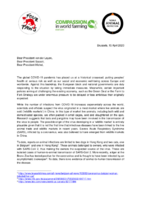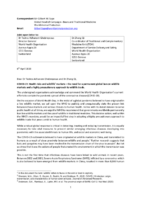
COVID-19: a failure in human-animal relations?
International NGOs call on the EU’s top leaders to protect animals
Brussels, 15 April 2020 - Three major international animal welfare organisations have submitted an open letter to the presidents of the European Commission, Council and Parliament calling for leadership to prevent future public health crises. The letter highlights that the COVID-19 pandemic was triggered by fundamental problems within our current approach towards animals and the environment. Scientists suspect the virus originated in ‘wildlife markets’ in China, with possible involvement of bats and pangolins. The current pandemic, which puts human health at risk and challenges the social and economic well-being of people across Europe, is inherently connected to our failure to protect animals.
The letter also underlines problems associated with activities that enable close contact between people and animals of different species, both wild and domesticated. The conventional farming system, highly resilient on long transport routes, is identified as a particular public health risk as well as the trade in wild animals, such as for use as food or as part of traditional Asian medicine. The financial implications of the crisis are also expected to have an impact on animal welfare in Europe, as was the case after the 2007 financial crisis when there was an increased rate of abandonment and neglect of pets.
The organisations included a list of seven demands to President Von der Leyen, Sassoli and Michel concerning specific EU policies, including:
♦ To immediately put an end to the long-distance transports of live animals across the EU and to third countries, limiting transport distances to the closest appropriate slaughterhouse and have meat and genetic material transported instead;
♦ To keep a high level of ambitions for the Green Deal including the Farm to Fork Strategy as well as in the Common Agriculture Policy, to promote a shift towards shorter production chains, higher-welfare animal farming practices addressing antimicrobial resistance (AMR) respecting the environment and restoring biodiversity;
♦ To define adequate veterinary care and animal keeping as essential services and ensure sufficient support to rescue centres and sanctuaries because of the imminent increase in rescue requests
♦ To end the use of wild animals in circuses to ensure zoonotic diseases are not spread through public displays and close contact with animals that spend their lives in cramped conditions and constantly traveling;
♦ To use all diplomatic means to put pressure on international partners to ban markets where wildlife and cats and dogs are sold and to unequivocally exclude the use of wildlife, including from captive bred specimens, in the production of traditional medicine;
♦ To address the potential risks to human health from the commercial trade in wildlife – whether originating from captive-breeding, farming or taken from the wild – and act to end inter-country trade in wild animals or limit such trade in order to mitigate those risks;
♦ To support the embedding of the “one health” and “one welfare” approaches that includes animals in every Sustainable Development Goal, and support the creation of a new goal, specifically on the human-animal connection at the review of the 2030 Agenda.
FOUR PAWS is the global animal welfare organisation for animals under direct human influence, which reveals suffering, rescues animals in need and protects them. Founded in 1988 in Vienna by Heli Dungler, the organisation advocates for a world where humans treat animals with respect, empathy and understanding. FOUR PAWS’ sustainable campaigns and projects focus on companion animals including stray dogs and cats, farm animals and wild animals – such as bears, big cats, orangutans and elephants – kept in inappropriate conditions as well as in disaster and conflict zones. With offices in Australia, Austria, Belgium, Bulgaria, Germany, Kosovo, the Netherlands, Switzerland, South Africa, Thailand, Ukraine, the UK, the USA and Vietnam as well as sanctuaries for rescued animals in twelve countries, FOUR PAWS provides rapid help and long-term solutions. www.four-paws.org


